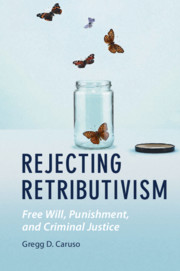Book contents
- Rejecting Retributivism
- Law and the Cognitive Sciences
- Rejecting Retributivism
- Copyright page
- Dedication
- Contents
- Acknowledgments
- 1 Free Will, Legal Punishment, and Retributivism
- 2 Free Will Skepticism
- 3 The Epistemic Argument against Retributivism
- 4 Additional Reasons for Rejecting Retributivism
- 5 Consequentialist, Educational, and Mixed Theories of Punishment
- 6 The Public Health–Quarantine Model I
- 7 The Public Health–Quarantine Model II
- 8 The Public Health–Quarantine Model III
- 9 The Public Health–Quarantine Model IV
- References
- Index
3 - The Epistemic Argument against Retributivism
Published online by Cambridge University Press: 06 May 2021
- Rejecting Retributivism
- Law and the Cognitive Sciences
- Rejecting Retributivism
- Copyright page
- Dedication
- Contents
- Acknowledgments
- 1 Free Will, Legal Punishment, and Retributivism
- 2 Free Will Skepticism
- 3 The Epistemic Argument against Retributivism
- 4 Additional Reasons for Rejecting Retributivism
- 5 Consequentialist, Educational, and Mixed Theories of Punishment
- 6 The Public Health–Quarantine Model I
- 7 The Public Health–Quarantine Model II
- 8 The Public Health–Quarantine Model III
- 9 The Public Health–Quarantine Model IV
- References
- Index
Summary
In this chapter, I would like to develop a second independent argument against retributivism, which I call the Epistemic Argument. The argument maintains that even if one is not convinced by the arguments against free will and basic desert moral responsibility, it remains unclear whether retributive punishment is justified. This is because the burden of proof lies on those who want to inflict intentional harm on others to provide good justification for such harm (see Pereboom 2001, 2014; Vilhauer 2009, 2012, 2015; Shaw 2014; Corrado 2017; Caruso 2020). This means that retributivists who want to justify legal punishment on the assumption that agents are free and morally responsible (and hence justly deserve to suffer for the wrongs they have done) must justify that assumption. And they must justify that assumption in a way that meets a high epistemic standard of proof since the harms caused in the case of legal punishment are often quite severe. It is not enough to simply point to the mere possibility that agents possess libertarian or compatibilist free will. Nor is it enough to say that the skeptical arguments against free will and basic desert moral responsibility fail to be conclusive.
- Type
- Chapter
- Information
- Rejecting RetributivismFree Will, Punishment, and Criminal Justice, pp. 109 - 127Publisher: Cambridge University PressPrint publication year: 2021

